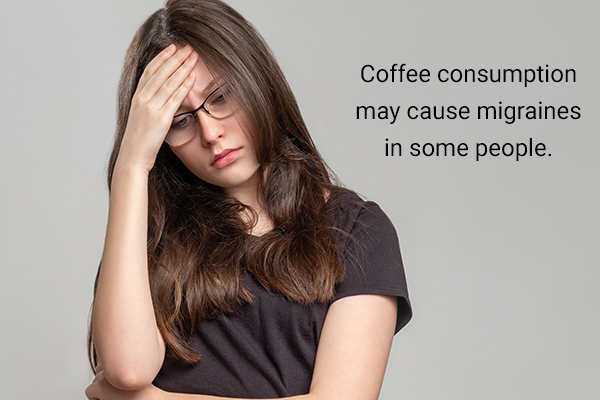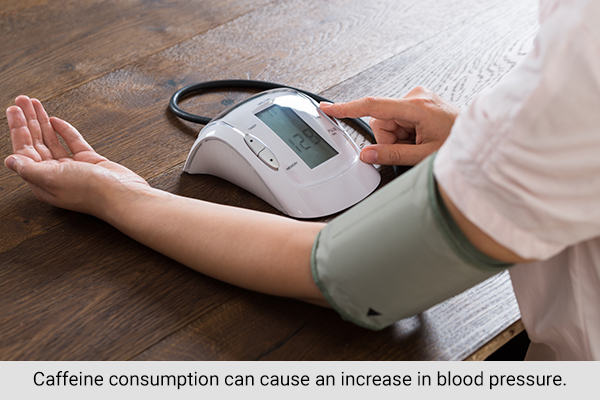Coffee is the most widely consumed nonalcoholic beverage in the United States. It offers some health benefits and is an effective pick-me-up when you are down. (1)

However, overconsumption of caffeine and an addiction to coffee are becoming common problems affecting millions of Americans today. According to research studies, you should not consume more than 400 mg of caffeine in a single day. (2)
This article compiles the adverse effects excessive coffee intake can have on your body. (3)
Dangers of Excessive Coffee Intake
Here are some common side effects of caffeine consumption.
1. Increased heartbeat
Caffeine, the active ingredient in coffee, is linked to an increase in heart rate. According to several studies, caffeine can trigger the release of adrenaline (a hormone that increases your heartbeat).
Apart from this, it also can cause contractions in the heart muscle. A rapid heartbeat can cause anxiety, nervousness, and insomnia. (4)
2. Migraine headaches

Coffee consumption may cause migraines in some people.
Caffeine can induce vasoconstriction (tightening of the blood vessels) in the body. Hence, when you do not drink your regular cup of coffee, the dilated blood vessels can increase blood flow and cause a blood rush to the head, leading to a headache. (5)
3. Sleep disorder, anxiety, panic attacks, inability to focus, delusion, and hallucination
Caffeine can bind to adenosine receptors in the brain and block them. (6) Adenosine is the chemical that makes you feel tired or sleepy and induces sleep. Since caffeine blocks adenosine receptors, it helps you freshen up and focus better (7)(8)
However, overconsumption of caffeine can mess with your body’s sleep cycle.
Coffee has also been linked to a disturbance in the body’s circadian rhythms by disrupting the melatonin balance. Disturbed sleep cycles can cause anxiety, insomnia, and panic attacks. (9)
4. Heartburn/reflux

Coffee consumption is linked to acidity or heartburn in some people. Caffeine can loosen the lower esophageal sphincter (LES) in the esophagus. The LES prevents the acidic contents of the stomach from traveling up into the esophagus.
A relaxed LES leads to acidity, heartburn, and a condition known as gastrointestinal reflux disease (GERD). This condition is more likely to occur in older or middle-aged people, a group most likely to have high caffeine intake. (10)(11)
5. Frequent urination
Some research studies indicate that drinking coffee regularly can lead to increased urination. Caffeine can act on the muscular walls of the urinary bladder and cause frequent contractions. This may induce an urge to urinate more often than normal. (12)(13)
6. Addiction
Caffeine has been found to be addictive in high doses, especially in teenagers and young adults. It is one thing to drink a cup of coffee to refresh yourself on a tiring day, but being unable to function without it may be a sign of addiction.
Caffeine withdrawal in such people can cause headaches, drowsiness, and irritability. (14)
7. Increased blood pressure

Caffeine consumption can cause an increase in blood pressure.
Caffeine has been proven to block adenosine receptors in the brain, which may indirectly cause an increase in systolic blood pressure. Over time, this can cause hypertension in some people. (15)
8. Dehydration
Excessive caffeine consumption can lead to increased urination. This can be a risk factor for dehydration.
Research shows that college students who drink more than 2–3 cups of coffee in a day are more likely to be dehydrated, even after drinking enough water. (16)
9. Increased thirst
Since caffeine triggers increased urination, drinking coffee in large amounts may make you feel thirsty throughout the day.
Coffee is a diuretic and causes water loss from the body. If this thirst is not properly quenched, it can result in a state of dehydration. (16)
Final Word
Drinking coffee in moderate amounts can help you feel refreshed and energized, especially at the start of the day. It is known to increase your cognitive abilities and help you focus on your work.
However, overconsumption of caffeine can be harmful to the body in the long. Thus, try to limit your coffee intake to 2 cups a day to only reap its benefits.
- Was this article helpful?
- YES, THANKS!NOT REALLY


